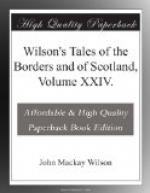In the solary, up in the western wing,
The Countess and Yerl sat sorrowing
For one so young, so gentle, and fair,
Their only child, lying ailing there,
Waning and waning slowly away,
Yet waxing more beautiful every day,
As if she were drawing from spheres above,
Before she got there, the spirit of love,
Which shone as a light through the silken lire,
Pure as was that of the vestal fire;
And ever she kissed in hysterical mood
The bit of the cross all red with blood.
“Oh mother dear! I wish—I fear
The time of my going is drawing near:
Last night, at the mirk and midnight hour,
A voice seemed to come through my chamber door—
For the ear of the dying is tender and fine—
And three times it sounded Etheline;
And it is true, as I’ve heard say,
Such voices are calls to come away—
The voices of angels hovering near,
Who wish us to join them in yonder sphere.”
“Oh! no, oh! no, my own dear child,
Thine overfine ears have thee beguiled:
It was the Yerl, when in a dream,
Who three times called thy dear-loved name;
I heard the call as awake I lay,
And thou mayst believe what now I say.”
“Oh mother! oh mother! what do I hear?
It is the nightingale singing clear;
I have heard the notes in Italian clime,
And remember them since that early time;
And it is true, as I’ve heard say,
That when the nightingale sings by day,
The dying who hears it will pass away.”
“No, no, my child, the song you hear
Is that of the throstle-cock singing clear:
I see him upon the linden tree,
And you, if you like, may also see.
I know its speckled breast too well;
It is not, dear child, the nightingale.”
When this she heard, the maiden sighed,
As if she were vexed she was denied
The hope of passing quickly away
To yon regions bright of eternal day.
“Oh mother! list, what do I hear?
Sir Peregrine’s horn is winding clear;
Ah, I know the sound, as it seems to say
In its windings, ‘Hali-hali-day;’
And it is true, as I’ve heard tell,
When a dead man’s horn sounds loud and shrill,
It is a true sign to his earthly bride,
He will wait for her spirit at evening tide.”
The Countess turned her face to the Yerl;
It was true what was said by the dying girl;
It was Sir Peregrine’s horn they heard,
And they both sat mute, nor whispered a word,
For they wondered much, and were sore afraid
Of mysteries working about the maid,
Who, as she lay in her ecstasie,
Kept muttering slow an Ave Marie:
“Oh, Lady sweet! the sign hath come,
Happy the maid whom her knight calls home;
It is the nightingale that I hear,
The golden sun is shining clear;
And I’ve heard tell in time past gone,
Blessed is the bier that the sun shines on.”




